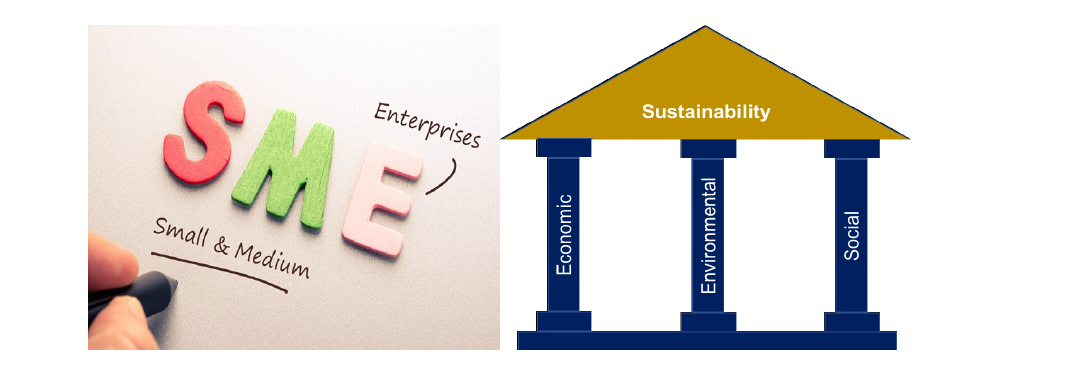Chinomnso Onwunta
SMEs - categorically defined as organizations with 1 to 250 employees - contribute in vast ways to the economic growth and development of several economies; but also face numerous social, economic, and environmental challenges. These three aspects are known as the pillars of sustainability. SMEs are usually for-profit entities, however one major challenge they usually face, especially in developing contexts, is that of financial constrain.
This challenge affects their ability to prioritize anything else except economic survival (Abisuga-Oyekunle, Patra & Muchie, 2019). Consequently, SMEs may consider the other aspects of sustainability as an additional burden that impact on resource usage. Nonetheless, SMEs provide a large number of goods/services and employ people tasked with doing the day-to-day activities necessary for this very economic survival. How are these employees developed and trained to thing beyond the economic pillar? In Sub-Saharan Africa, SMEs account for 95% of companies (Abisuga-Oyekunle et al., 2019), which means that effective development of SMEs contribute to the creation of national economic growth thereby enhancing the communities in which they operate (Auemsuvarn, 2019). Numerous studies have indicated the role of government in facilitating the development of SMEs and the implementation of sustainable development within these organizations but have primarily hinged on governmental policies and how they impact and affect the SMEs’ contribution to society. It is my belief that the onus is not only up to government, and a top-down approach should not necessarily be the approach for achieving balance sustainability (Ali, Hussain, Zhang, Nurunnabi, & Li, 2018).
Studies suggest that society and diverse stakeholders are increasingly putting pressure on organizations to consider their climate impact, and are willing to patronize organizations that adopt sustainable practices (Darus, Mohd & Yusoff, 2019). So then, it is of great importance that SMEs find new ways to add value to society, implement and operationalize sustainable development (Masocha & Fatoki, 2018a). The role of leadership is important to the extent of which these pillars are balanced within organizations (Bayle-Cordier, Mirvis & Moingeon, 2012); yet SMEs continue to report a lack of sustainability knowledge within the management level. Thus, increased educational initiatives are important to facilitate the effective balancing of the three major pillars of sustainability.
It is suggested that organizations are perhaps willing to work towards a balanced sustainable outcome but are more focused on the economic viability of the organization (Masocha & Fatoki, 2018b). The development of SMEs in certain parts of the world is vital to promote sustained, inclusive and sustainable economic growth, equitable and fair social cohesion, and the prioritization of the ecological environment. Yet, despite all the potential positive contributions of SMEs to economies, many of these organizations keep failing.
The failure of SMEs draws attention to the overall sustainability of SMEs. The puzzle is whether SMEs cater for the wrong needs, by mainly focusing on the financial and economic aspect of sustainability, as society is transitioning beyond focus on the economy. On the other hand, if these entities mainly focus on the environment and the social aspect, there might not be enough support from the government and/or other financial agencies to finance them. This in turn might mean that these organizations are viewed as a social innovation/entrepreneurship, which doesn't have the same outlook or traction as traditional business ventures in many countries.
Finally, SMEs (especially newly established) have the potential to fully integrate the three traditional pillars of sustainability in their operations. But for this to happen, there has to be an environment that encourages and fosters such efforts through incentives and rewards. More importantly, increased education and understanding of these concepts is fundamental!
REFERENCES
Abisuga-Oyekunle, O. A., Patra, S. K., & Muchie, M. (2019). SMEs in sustainable development: Their role in poverty reduction and employment generation in sub-Saharan Africa. African Journal of Science, Technology, Innovation and Development, 1–15. https://doi.org/10.1080/20421338.2019.1656428
Ali, S., Hussain, T., Zhang, G., Nurunnabi, M., & Li, B. (2018). The Implementation of Sustainable Development Goals in “BRICS” Countries. Sustainability, 10(7), 2513. https://doi.org/10.3390/su10072513 59–73. https://doi.org/10.1007/s13753-020-00247-0
Auemsuvarn, P. (2019). “How brand personality can assist in achieving the sustainable development goals (SDGs) for small and medium-sized enterprises (SMEs) in developing countries.” Journal of Business & Retail Management Research, 13(Special Edition).
Bayle-Cordier, J., Mirvis, P. H., & Moingeon, B. (2012). Leadership, Social Responsibility, and Projected Identity: The Ben & Jerry’s Story. Academy of Management Proceedings, 2012(1), 12029. https://doi.org/10.5465/AMBPP.2012.12029 https://doi.org/10.1016/j.exis.2019.05.017
Darus, F., Mohd Zuki, H. I., & Yusoff, H. (2019). The path to sustainability: Understanding organisations’ environmental initiatives and climate change in an emerging economy. European Journal of Management and Business Economics, 29(1), 84–96. https://doi.org/10.1108/EJMBE-06-2019-0099
Fatoki, O. (2018a). The Impact of Entrepreneurial Resilience on the Success of Small and Medium Enterprises in South Africa. Sustainability, 10(7), 2527. https://doi.org/10.3390/su10072527
Kasekende, L., Mlambo, K., Murinde, V., & Zhao, T. (2009). Restructuring for Competitiveness: The Financial Services Sector in Africa’s Four Largest Economies (pp. 49–81). World Economic Forum.
Masocha, R., & Fatoki, O. (2018a). The Role of Mimicry Isomorphism in Sustainable Development Operationalisation by SMEs in South Africa. Sustainability, 10(4), 1264. https://doi.org/10.3390/su10041264
Masocha, R., & Fatoki, O. (2018b). The Impact of Coercive Pressures on Sustainability Practices of Small Businesses in South Africa. Sustainability, 10(9), 3032. https://doi.org/10.3390/su10093032
Nieuwenhuizen, C. (2019). The effect of regulations and legislation on small, micro and medium enterprises in South Africa. Development Southern Africa, 36(5), 666–677.


